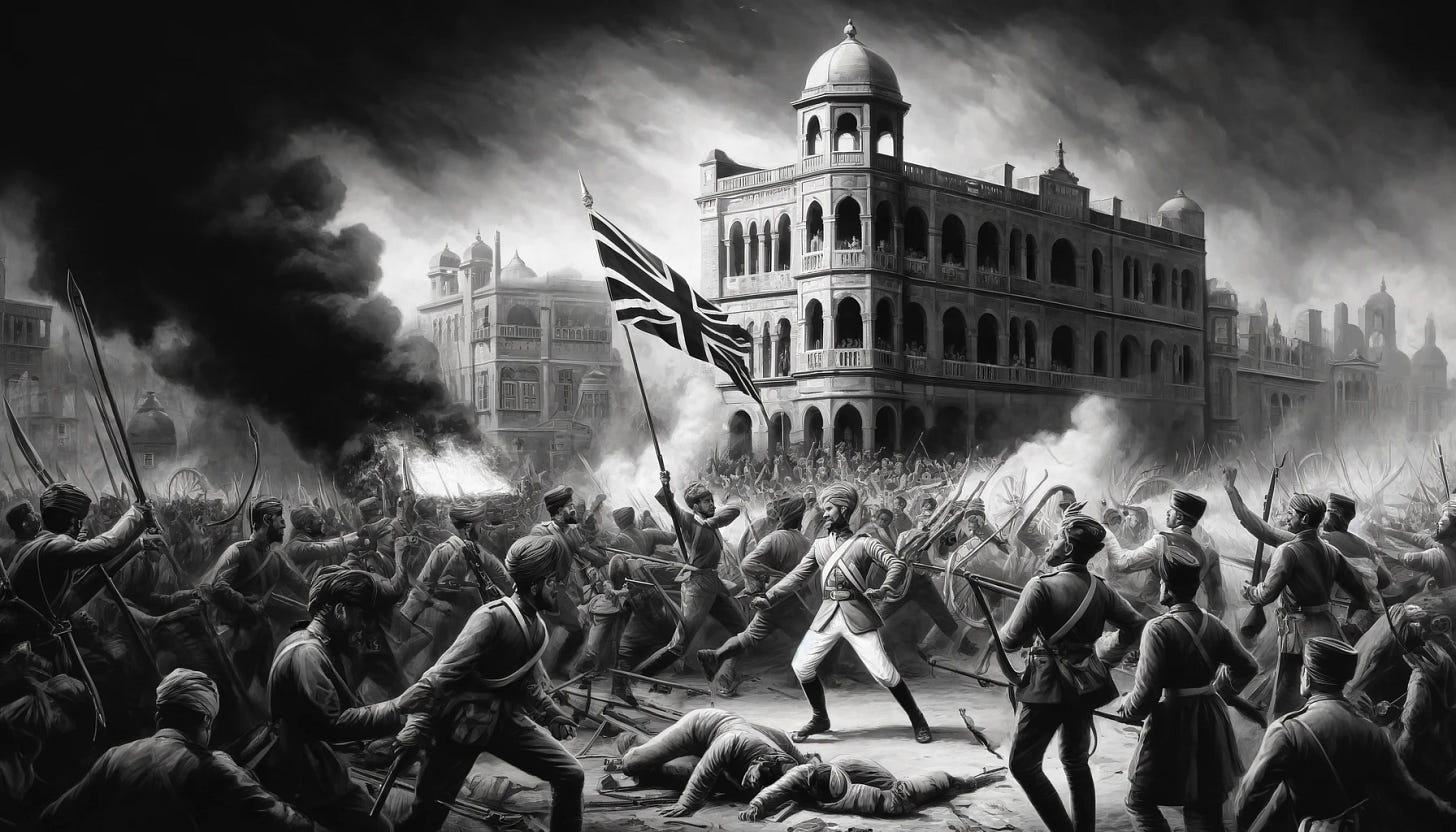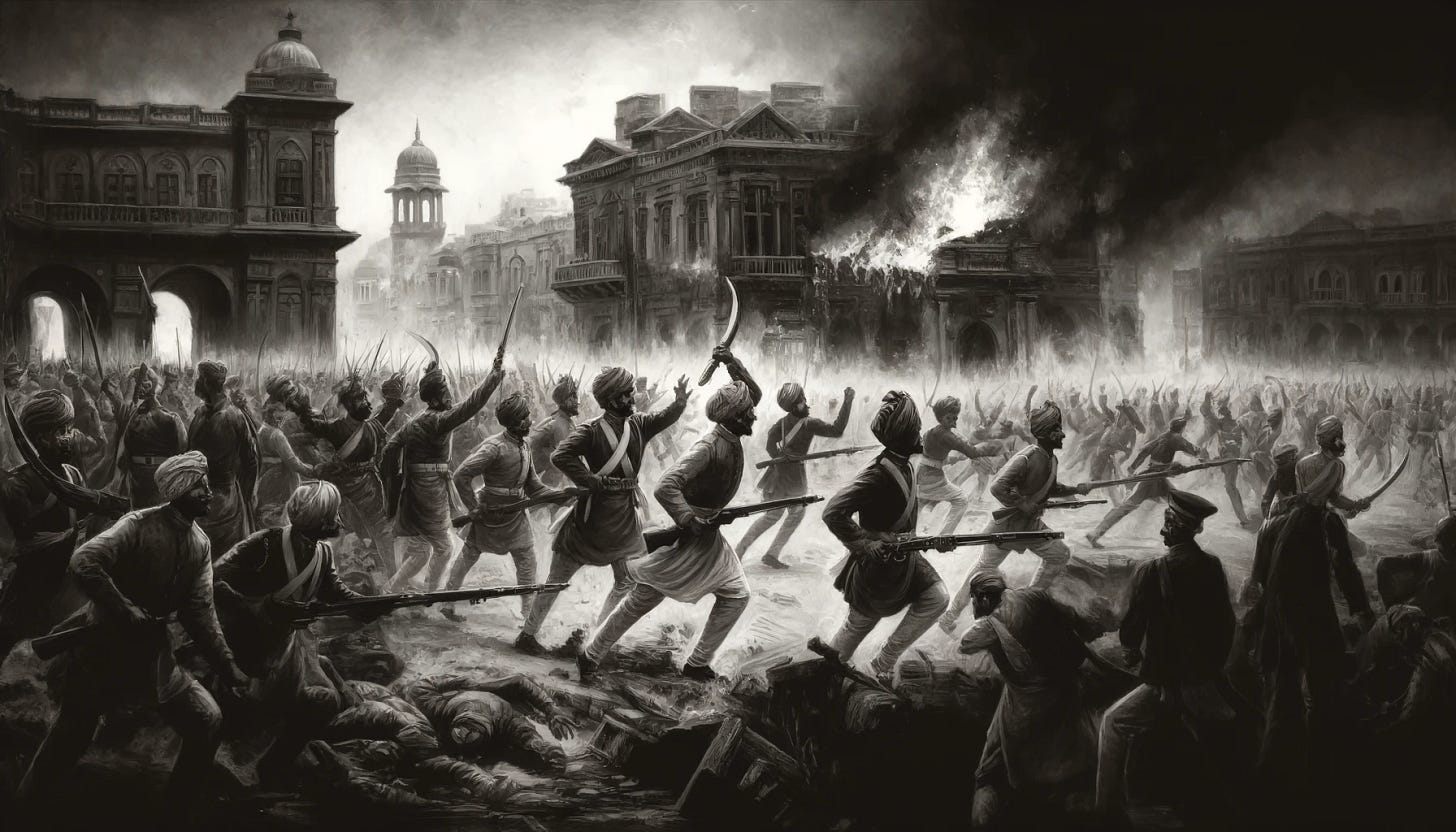The First Indian War of Independence: Triggered on 10th May 1857
Commemorating the First Indian War of Independence: Triggered on 10th May 1857, Remembered on 10th May 2024
Introduction: The Spark of Rebellion
On 10th May 1857, exactly 167 years ago today, discontent flared in the town of Meerut, lighting the fuse that would lead to the First Indian War of Independence, also described by the British historians as the Sepoy Mutiny. In defiance of their British officers, the sepoys, or Indian soldiers of the British East India Company's army, mutinied. Their revolt was the beginning of a momentous and violent struggle that would change the course of Indian history.
The Immediate Cause: Enfield Rifles and Cartridges
The introduction of new Enfield rifles with cartridges believed to be greased with beef and pork fat was the immediate trigger for the mutiny. Hindu and Muslim sepoys found the cartridges deeply offensive due to their religious beliefs, and their refusal to use them led to swift and brutal punishment from the British. This provoked anger, fanned long-standing grievances against British rule, and finally drove the sepoys to open rebellion.
March to Delhi and the Re-Emergence of Bahadur Shah II
The mutiny at Meerut quickly spilled into neighbouring regions. The rebellious sepoys marched to Delhi on 11th May, proclaiming the last Mughal emperor, Bahadur Shah II, as the sovereign ruler of India. Though his authority was largely symbolic, his re-emergence gave the rebellion a unifying identity and a central rallying point for further uprisings in northern and central India.
Major Battles and Sieges of the Mutiny
Siege of Delhi: Following the occupation of Delhi, the British launched an aggressive campaign to retake the city. The siege lasted from June to September 1857, eventually resulting in the British recapturing the city and forcing Bahadur Shah II into exile to Burma, officially marking the end of the Mughal dynasty.
Siege of Cawnpore (Kanpur): Nana Sahib, one of the prominent Indian leaders of the rebellion, led forces that besieged the British garrison in Cawnpore. The British eventually surrendered, but many survivors were massacred, leading to severe reprisals by the British in the later stages of the mutiny.
Siege of Lucknow: One of the most prolonged engagements, the Siege of Lucknow saw British residents and soldiers withstand multiple attacks before relief forces finally broke through. The recapture of Lucknow marked a decisive turning point in favour of the British.
Battle of Gwalior: As the rebellion lost momentum in 1858, Gwalior became a critical battleground. Rani Lakshmibai of Jhansi, one of the notable female leaders of the uprising, led her forces in a valiant defence before succumbing in battle, further dampening rebel morale.
The Aftermath: A New Era in Indian Rule
After a year and a half of bloody conflict, the British ultimately suppressed the mutiny by 1859. The aftermath signalled a seismic shift in British rule: the British East India Company was dissolved, and the administration of India passed directly to the British Crown. In 1876, Queen Victoria was officially proclaimed Empress of India, a title that formalised the consolidation of British power. The British government, anxious to prevent future uprisings, introduced sweeping reforms to reorganise the army and reinforce loyalty among the Princely States.
Reflections: Legacy of the 1857 Rebellion
Although the 1857 rebellion was ultimately quelled, it left an indelible mark on Indian history. The uprising weakened British rule and sowed the seeds for organised nationalist movements that emerged in the late 19th and early 20th centuries. The bravery and sacrifice of the sepoys, leaders like Rani Lakshmibai and Nana Sahib, and countless others who took part in the struggle for freedom remain a source of inspiration, reminding us of the enduring spirit of resistance against oppression.
Today, on 10th May 2024, we commemorate this historic milestone, acknowledging those who fought courageously in India's first organised uprising against colonial rule. Amid the dust and din of the Lok Sabha elections, it is disappointing that not a single political party paused to reflect on this momentous day, a hallmark of Indian nationalism and patriotism. Let us remember the legacy of the First War of Independence and ensure that its spirit continues to inspire generations to stand against oppression and fight for freedom.






